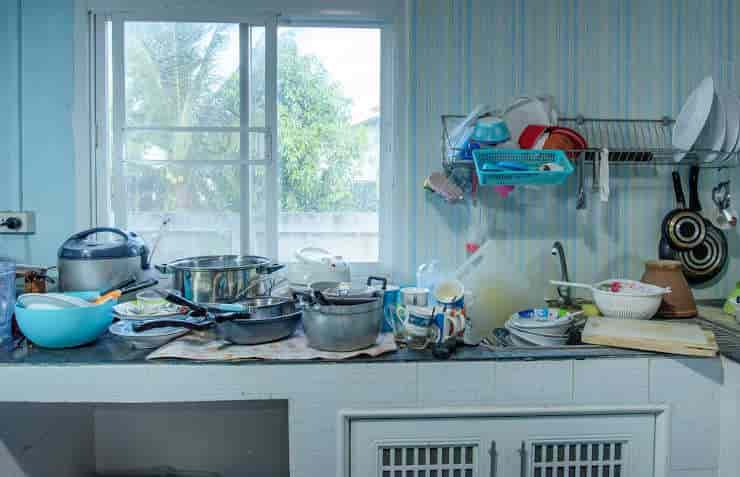Do you ever feel overwhelmed by the sight of clutter and mess in your home? Have you walked in the door only to feel overloaded by scattered papers, unwashed dishes and clothes in disarray? Maybe you’ve even had arguments because it bothers you more than it bothers you partner or housemates.
You’re not alone. Many people report a messy house can trigger feelings of stress and anxiety.
So why do clutter and chaos make some of us feel so overwhelmed? Here’s what the research says – and what you can do about it.
Cognitive Overload

When we’re surrounded by distractions, our brains essentially become battlegrounds for attention. Everything competes for our focus.
But the brain, as it turns out, prefers order and “single-tasking” over multitasking.
Order helps reduce the competition for our attention and reduces mental load. While some people might be better than others at ignoring distractions, distractable environments can overload our cognitive capabilities and memory.
Clutter, disorder and mess can affect more than just our cognitive resources. They’re also linked to our eating, productivity, mental health, parenting decisions and even our willingness to donate money.
A Bigger Impact on Women than Men?
Research suggests the detrimental effects of mess and clutter may be more pronounced in women than in men.
One study of 60 dual-income couples found women living in cluttered and stressful homes had higher levels of cortisol (a hormone associated with stress) and heightened depression symptoms.
These effects remained consistent even when factors like marital satisfaction and personality traits were taken into account. In contrast, the men in this study seemed largely unaffected by the state of their home environments.
The researchers theorized that women may feel more responsible for maintaining the home. They also suggested the social aspect of the study (which involved giving home tours) may have induced more fear of judgment among women than men.
We will all live with clutter and disorganization to some degree in our lives. Sometimes, however, significant clutter problems can be linked to underlying mental health conditions such as obsessive-compulsive disorder, hoarding disorder, major depressive disorder, attention deficit hyperactivity disorder, and anxiety disorders.
This raises a crucial question: which came first? For some, clutter is the source of anxiety and distress; for others, poor mental health is the source of disorganisation and clutter.
Not all Messes are Problematic
It’s important to remember clutter isn’t all bad, and we shouldn’t aim for perfection. Real homes don’t look like the ones in magazines.
In fact, disorganized spaces can result in increased creativity and elicit fresh insights.
Living in constant disorder isn’t productive, but striving for perfectionism in cleanliness can also be counterproductive. Perfectionism itself is associated with feeling overwhelmed, anxiety and poor mental health.
Anxiety Over a Messy House – What Can I Do About It?
It’s important to remember you have some agency over what matters to you and how you want to prioritize your time.
One approach is to try to reduce the clutter. You might, for example, have a dedicated de-cluttering session every week. This may involve hiring a cleaner (if you can afford it) or playing some music or a podcast while tidying up for an hour with your other household members.
Establishing this routine can reduce clutter distractions, ease your overall mental load and alleviate the worry that clutter will spiral out of control.
You can also try micro-tidying. If you don’t have time for a complete cleanup, commit just five minutes to clearing one small space.
If other household members primarily cause the clutter, try to calmly discuss with them how this mess affects your mental health. See if your kids, your partner or housemates can negotiate some boundaries as a household over what level of mess is acceptable and how it will be handled if that threshold is exceeded.
It can also help to develop a self-compassionate mindset.
Mess doesn’t define whether you are a “good” or “bad” person and, at times, it may even stimulate your creativity. Remind yourself that you deserve success, meaningful relationships and happiness, whether or not your office, home or car is a mess.
Take comfort in research suggesting that while disorganized environments can make us susceptible to stress and poor decision-making, your mindset can buffer you against these vulnerabilities.
If clutter, perfectionism or anxiety has begun to seem unmanageable, talk with your GP about a referral to a psychologist. The right psychologist (and you may need to try a few before you find the right one) can help you cultivate a life driven by values that are important to you.
Clutter and mess are more than just visual nuisances. They can have a profound impact on mental wellbeing, productivity and our choices.
Understanding why clutter affects you can empower you to control your mindset, living spaces and, in turn, your life.
Erika Penney is a Lecturer in Clinical Psychology at the University of Technology Sydney. This article is republished from The Conversation under a Creative Commons license.

Last Updated on September 23, 2023
